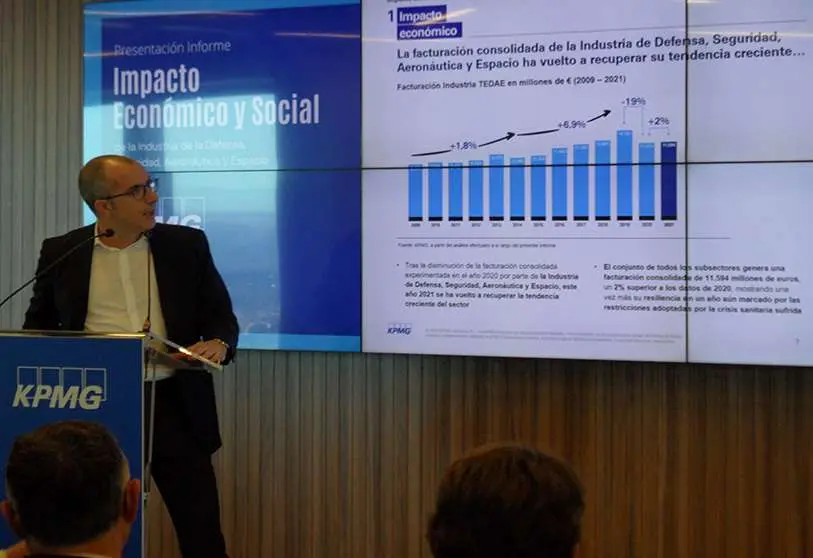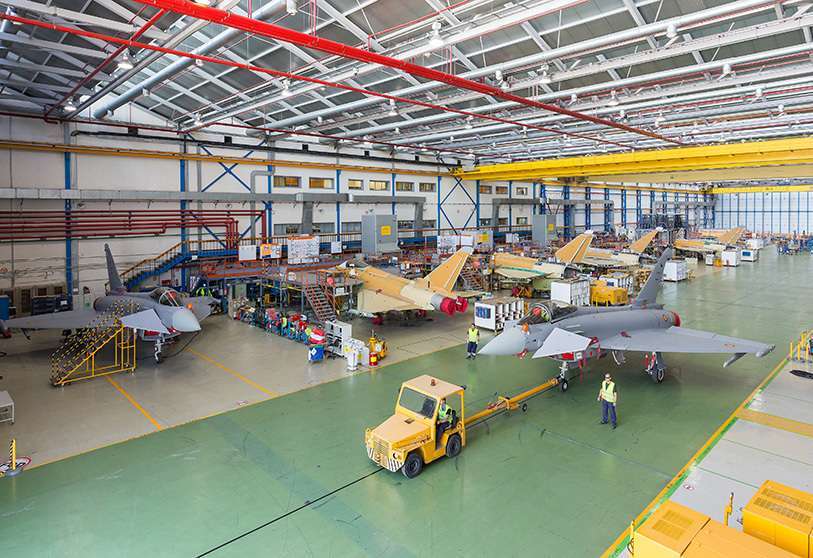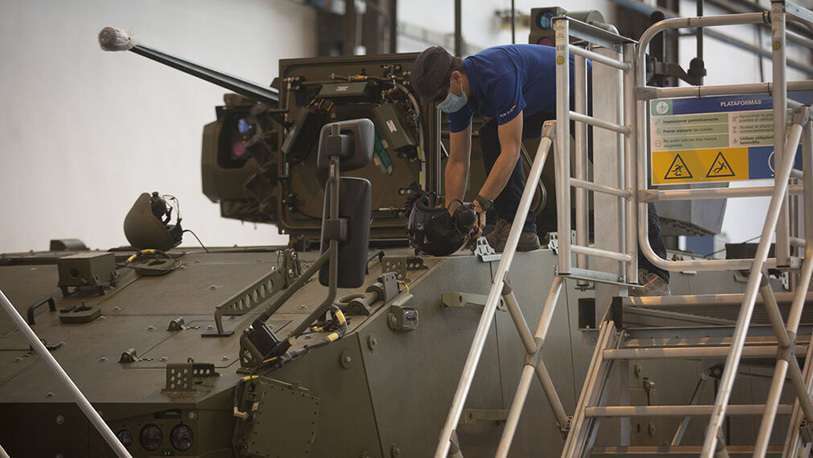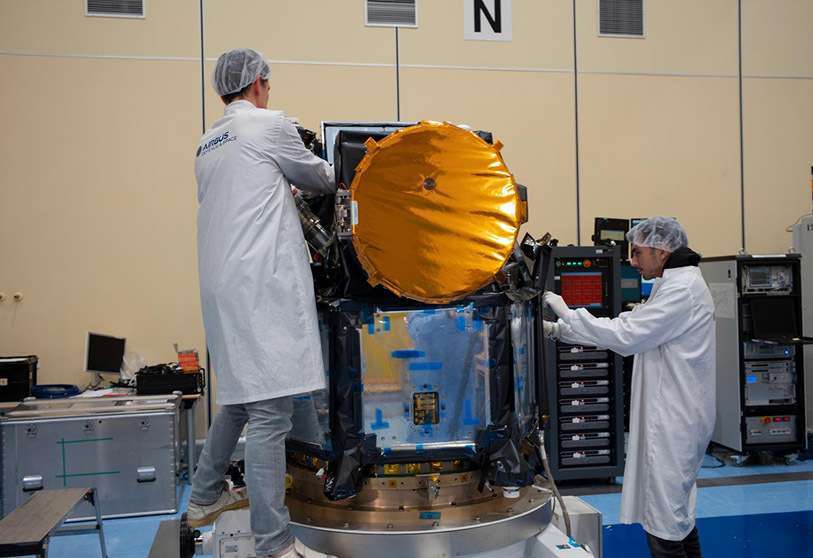The Spanish aerospace and defence ecosystem invoices 11,600 million in 2021 and begins to rebound

The 90 companies that make up the Spanish Association of Defence, Security, Aeronautics and Space Technology Companies (TEDAE) achieved a turnover of 11,594 million euros in 2021, representing a growth of 1.6% over the previous year.
And exports totalled 5,433.5 million, which represents 46.9% of the total turnover. This is the brief summary of the report entitled "Economic and social impact of the defence, security, aeronautics and space industry", drawn up by a team from KPMG under the direction of Begoña Cristeto, partner in charge of Automotive and Industry at the aforementioned consultancy firm.
The Secretary General for Industry and Small and Medium Enterprises between 2014 and 2018 with the Government of President Mariano Rajoy, Begoña Cristeto, took advantage of the presentation of the report on 11 November to call for "greater agility and simplicity" in the execution of the PERTE Aerospace funds. In an auditorium where optimism for the future reigned, there were the directors of the companies associated with TEDAE, as well as the general directors of Industry, Galo Gutiérrez, Armament and Material, Admiral Aniceto Rosique, and Defence Economic Affairs, Air Force General José Luis Sanchez.

The document drawn up by KPMG for the third consecutive year reflects with data, figures, charts and graphs that "the recovery has arrived, it started last year", said Jorge Sainz, partner of KPMG Sales Strategy, despite the health crisis caused by COVID-19, the breakage of supply chains, the closure of numerous factories and production lines, as well as the brutal fall in air movements.
The top position is held by the military and civil aeronautics sector, which in 2021 will account for sales of 8,104 million euros - 69.9 percent of TEDAE's total - and exports of 44.4 percent. However, due to the foreign market, it is the one that has shown the least signs of recovery in terms of turnover. The civil sector has suffered a further decline, with a turnover of 3,553.007 million - a fall of around 7% - and a volume of exports of 1,514.428 (42.6%).
On the other hand, its military component has experienced a growth of 5%, with a turnover of 4,551.038 million euros (39%), of which 2,087.300 (45.9%) have gone to third countries. The aeronautical sector is followed in importance by the defence industries dedicated to the development, production and support of land and naval weapons systems, totalling 2,326.27 million euros, with nearly 45 percent going to exports.
The maritime component is worth 1,448.49 million, an increase of 5 per cent, and the land component is worth 877.88 million, an increase of nearly 15 per cent. The space and security sectors have also experienced increases. In 2021, the space sector saw a 2 per cent increase in sales and reached a turnover of 979.28 million, 80 per cent of which was placed in foreign markets. The security industry has a turnover of 184.36 million, and its exports are limited to 2.7 percent of its products and services.

KPMG's analysis concludes that the ecosystem of TEDAE companies "is already in the change of cycle, it is already in clear recovery", and that the aerospace, defence and security sectors generate "a brutal strategic impact, of the order of 1.4 per cent in the GDP of the Spanish economy". It is obvious that the figures show that we are already on the path to a return to growth, although the figures for 2021 do not even reach the turnover of 2017, which was 11,995 million, and are still a long way from those of 2019, which were 14,101 million.
For the president of TEDAE, Ricardo Martí Fluxá, the KPMG report shows that the 90 companies that make up the association "are pillars of the new economic model", which over the past year have shown signs of their strength, of being once again "engines" of the Spanish economy and of the start of the economic recovery.
He stressed that these are "full-cycle industries, with their own products, which make up supply chains and are at the forefront of technology". Martí Fluxá once again reiterated that TEDAE companies "need budgetary plans", but above all "stable and continuous" over time, in order to "provide greater predictability to investments and programmes that are initiated, establishing long-term financial commitments".
He stressed that the PERTE Aerospace is "a hope for the future", as long as it is consolidated as a "stable tool" for the sector. He also timidly threw down the gauntlet to the government of President Sanchez by asking that "perhaps the time has also come to think about a PERTE for defence", with which to have "financial tools with which to accompany our companies to work together", said Martí Fluxá.

With regard to the workforce, the companies associated with TEDAE have managed to retain talent and even increase their recruitment, totalling 49,625 direct jobs "and another 150,000 indirect and induced jobs", according to the analysis of the KPMG team headed by Jorge Sainz.
The aeronautical sector as a whole directly employs 33,935 people - 18,566 in civil aviation and 15,369 in military aviation - which represents 68.38% of the total. The rest work in naval (6,177) and land (3,408) defence companies, in the space sector (4,980) and to a lesser extent (1,126) in the security companies belonging to TEDAE.

An important area to which all four sectors pay particular attention is investment in research, development and innovation. In the past year, a total of 1,176.96 million was invested, which represents no less than 10.2 percent of turnover. The largest investments were made in the space sector, which accounted for 21.5 percent of turnover (210.99 million), followed by military aeronautics, which invested 522.86 million, or 11.5 percent, according to the KPMG report.
The Director General of Industry and Small and Medium Enterprises of the Ministry of Industry, Galo Gutiérrez, took advantage of the closing of the presentation of the KPMG report to announce that his team is preparing the report of the PERTE de Descarbonización de la Industria for its submission to the Council of Ministers, "in which many of the companies of TEDAE will be able to participate".









